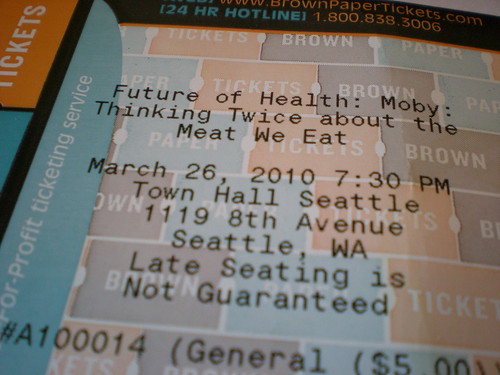
I attended an event at Town Hall Seattle last night where chart-topping musician and longtime vegan Moby and his co-editor, Miyun Park, discussed their book, Gristle: From Factory Farms to Food Safety. Normally I would fear attending an event featuring two vegans talking about food ethics and politics. I was hoping Moby would not lecture us on how superior and morally just vegans are compared to planet-decimating carnivores.
Moby, however, was surprisingly self-deprecating, hilarious, charming, and anti-polemical. It's refreshing to hear someone who has been a vegan for almost 20 years look back on his strident youth and admit: "My militancy was truly annoying." (And I'm not just picking on vegans; this kind of insufferableness is present among a multitude of people who claim moral high ground over a polarizing issue.) How truly annoying did Moby get? Well, he admitted that this happened around the beginning of his conversion to veganism: "To PROVE the depth of my commitment I decided that I would only talk to vegans." (Seriously. But it only lasted for 6 hours.) Therefore, in the spirit of overcoming vegan militancy, he envisioned Gristle as a collection of essays simply detailing the facts and ramifications of animal production rather than beating the drum for veganism.
Following Moby and Park's lengthy Q&A session, PubliCola sponsored a conversation with Kurt Timmermeister, who owns a farm on Vashon Island (Kurtwood) where he raises animals and makes cheese. Whereas Moby and Park were focused on veganism vs. factory farming, Kurt illustrated a model for humanely raising animals for food on a small scale. He also made a very good point about Moby's concern about the number of animals killed each year in the US for food production, a number that is in the billions. Kurt wondered, if we just cut the portion size of our steaks (and all our meats), how many less animals would be slaughtered?
The biggest thread I perceived between both discussions was the huge role that federal subsidies play in making food, especially fast-food and factory farm products, so cheap. It's not that high-quality food is so overpriced but, rather, fast-food is fantastically underpriced due to subsidies on beef, pork, and chicken.
The big topic that I would have liked to have seen Moby and Park discuss concerning the rise of factory farming and fast food is the lack of cooking going on in this country. You have a lot more control over your food choices and food costs if you are cooking at home. Then again, if you are living in an impoverished urban area, your food-purchasing options might just be fast food and a corner store devoid of fruits and vegetables. Economic injustice certainly has an impact on access to healthy food.
So how do we reduce the role of factory farming in this country? Going vegan? Buying from local, small-scale producers? Ending or shifting government subsides? Legislation and oversight? Discuss, Foodista readers.
Jameson Fink is a wine buyer at a bustling grocery store in Seattle’s Capitol Hill neighborhood. He moved to Seattle from Chicago (where he dabbled in the restaurant and wine industries) five years ago to pursue a full-time career in wine. He’d rather be drinking Champagne and eating popcorn right now.











Comments
March 27, 2010
[...] This post was mentioned on Twitter by Foodista, Barnaby Dorfman. Barnaby Dorfman said: News Flash: Hundreds Gather To Talk About Gristle: I attended an event at Town Hall Seattle last night where chart... http://bit.ly/9diZu3 [...]
March 29, 2010
[...] News Flash: Hundreds Gather To Talk About Gristle [...]
March 30, 2010
<strong>Social comments and analytics for this post...</strong>
This post was mentioned on Twitter by foodista: New blog post: News Flash: Hundreds Gather To Talk About Gristle http://bit.ly/cTjpH0...
April 7, 2010
[...] News Flash: Hundreds Gather To Talk About Gristle [...]